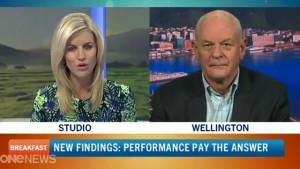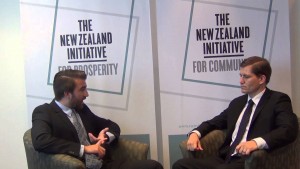
John Morris - Teachers pay report shifts weight to performance
John Morris, co-author of Teaching Stars: Transforming the Education Profession, being interviewed on TV ONE Breakfast show on 5 March 2014. Read more


John Morris, co-author of Teaching Stars: Transforming the Education Profession, being interviewed on TV ONE Breakfast show on 5 March 2014. Read more
Wellington (3 March 2014): New Zealand has made a good start towards lifting the status of teaching, but the pace of change could be sped up if pay scales were linked to performance, not seniority. That is one of the findings of The New Zealand Initiative’s latest report Teaching Stars: Transforming the teaching profession. Read more
Last week the QS World University Rankings by Subject were released, highlighting the top 200 universities in the world for individual academic subjects. With as much grandeur and status as the Oscars (or the Rugby World Cup), these rankings are considered to be highly influential worldwide in signalling the quality and reputation of universities. Read more
The New Zealand economy is undoubtedly in good shape but not all the factors behind the boom can or should be sustained indefinitely. This raises two questions: How much is temporary? Read more
Few economists are more famous than the Scotsman commonly regarded as the founder of economics, Adam Smith (1723-1790). On one hand this is understandable and much deserved: Smith’s An Inquiry into the Nature and Causes of the Wealth of Nations (1776) is the book that established economics as an academic discipline. Read more
The Wellington City Council this week started holding community meetings over plans to introduce cycle lanes across large parts of Wellington, with the aim of making cycling safer. The move has been backed by an editorial from Green Party MP Julie Anne Genter, an adviser to Mayor Celia Wade Brown, who claims bike-only lanes could lift the percentage of people cycling from about 2.6 per cent in 2006 to 7 per cent – on par with Portland Oregon. Read more
As we discussed in a previous issue of Insights, New Zealand is rated as one of the most congested countries in the world, according to the figures in the latest Tom Tom Traffic Index. The Amsterdam-based navigation company’s data shows that despite very small urban areas and a low population base, travelling in Auckland, Wellington, and Christchurch takes 31.3 per cent longer than it should, based on the optimal carrying capacity of the roading infrastructure. Read more
There are a few relationships in economics that are almost set in stone, with the odd exception to the rule. If supply increases, prices fall. Read more
In the for-and-against debate surrounding compact cities and their impact on housing affordability, Auckland and its Unitary Plan stand out as an oddity. The compact city term lacks a clear definition, but if you look for commonalities across the literature and practical examples of this urban form, two policy outcomes repeat themselves: urban growth restrictions and higher population densities. Read more

It is often said that tax is the price we pay for a civilised society. Indeed, taxes are necessary to fund key public services, including defence, law and order, the courts, border controls, civil defence, foreign affairs, public administration generally, and a contestably lengthy list of other potentially worthy activities of a collective nature. Read more
On Tuesday, I spoke at a conference organised by our sponsor, PortfolioConstruction Forum. The audience were mainly Australian and New Zealand investment advisors and wealth managers and my topic was the state of their respective economies. Read more
The government proudly announced this week that the percentage of students leaving school with minimum qualifications needed for a good life (NCEA Level 2) rose from two-thirds (67 per cent) in 2008, to over three-quarters (77 per cent) last year. Even more positively, the percentage of Māori students leaving school with NCEA Level 2 has increased from 44 to 59 per cent. Read more
Individuals should – and in most countries including New Zealand they do – have the right to make their own decisions about their lifestyle, such as which career path to follow, what to wear, and what to eat and drink. A number of lifestyle choices, particularly those regarding diet and exercise, have direct effects on an individual’s physical health. Read more
No, it was not a good start to the year for the European Union by any account. The French President had to spend more time sorting out his own private affairs than his country’s ailing economy, Italy managed to kick out the third Prime Minister in as many years, and the German Constitutional Court effectively killed the European Central Bank’s main policy to save the Euro. Read more